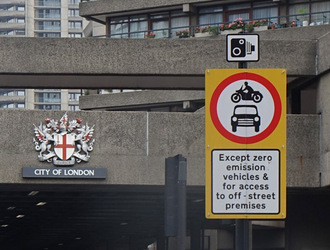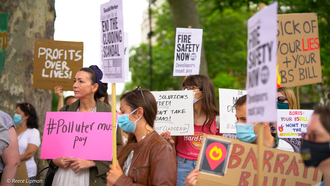-
Embarrassing the government should not be a crimeUnder new plans journalists could end up in prison for up to 14 years if they were to report on leaked documents that embarrass the Government. These plans are part of a reform of the Official Secrets Act. It could mean stories that are of public interest go unreported in the future and be hugely damaging for democracy within the UK. MPs and the press are already speaking out about the plans which they say will 'deter whistleblowers from coming forward'. Journalists should be allowed to report on issues which are in the public interest.114,799 of 200,000 Signatures
-
Bristol City Council : Support the nuclear ban treatyResolutions supporting the TPNW are being passed at all levels of local government; from town councils, such as Hebden Royd (West Yorkshire); through unitary authorities, such as East Ayrshire; to city councils, such as Manchester and Edinburgh. Internationally, resolutions have been passed by hundreds of towns and cities including Paris, Berlin and Washington D.C. We are deeply concerned about the grave threat that nuclear weapons pose to communities throughout the world. We firmly believe that our residents have the right to live in a world free from this threat. Any use of nuclear weapons, whether deliberate or accidental, would have catastrophic, far-reaching and long-lasting consequences for people and the environment. Therefore, we support the United Nations Treaty on the Prohibition of Nuclear Weapons and call on Bristol City Council to pass a resolution supporting it.212 of 300 SignaturesCreated by Hannah Tweddell
-
Close the holiday let tax loopholeI feel privileged to live in Plymouth. It's by the sea, has amazing beauty spots, Dartmoor is close by and the nightlife, pre-covid, was phenomenal. It is one of the UK's top tourist destinations. Unfortunately Plymouth's advantages can also be a disadvantage for its residents. I lived in my last flat for 5 years. The rent was affordable and it was close to the city centre – but was not in a great state of repair. When I complained to my landlord about the broken boiler and asked him to make repairs to his property, he threatened to evict me. One day a Section 21 notice arrived for me and the other tenants in the building, meaning we had to move out. The landlord said he was selling up because he did not want to be a landlord anymore. But a few months later, I discovered he had turned the building into an AirBnB. I found pictures online of my old flat which he had renovated and done up to perfection. My neighbours and I are not the only ones this has happened to. Plymouth has become a city of holiday lets. Cornwall has 62 homes to rent on Rightmove but 10,290 AirBnB listings. In one village in Wales, three quarters of the houses are holiday homes. Fewer homes available for residents mean higher rents, and people being priced out of their local areas in search of a home. That erodes local communities and starves local businesses of workers. The only people who benefit are the landlords. One cause of this is mortgage tax relief, which holiday-let landlords are entitled to but private rental landlords are not. It is saving holiday-let landlords potentially thousands of pounds every year, and actively dissuading them from renting their houses out to locals. After all, why rent to actual residents when the government has made it cheaper to let out holiday accommodation? We need a level playing field so that the local areas enjoy the right balance between holiday lets and homes people want to live in. By removing mortgage interest relief from holiday lets, more property owners will make their homes available to people who need somewhere to live. This will reduce rents, stop people being priced out, and make sure communities in tourist hotspots benefit.44,509 of 45,000 SignaturesCreated by Alex Macintyre
-
Consult with residents on a new, improved Zero Emission Zone (ZEZ) around the BarbicanThe BA, representing Barbican residents, is committed to the improved air quality, reduced traffic noise, and improved safety for pedestrians and cyclists, that a ZEZ will bring to the area. (see the BA’s submission to the City’s Streets and Walkway’s Sub-committee https://barbicanassociation.co.uk/wp-content/uploads/2021/02/BA-proposal-on-future-of-Beech-Street-scheme.pdf). The failure of the City of London to engage with residents has meant that the existing experiment was badly designed and implemented and has failed in its objectives of evaluating the impact of a zero-emission scheme around the Barbican. In addition, the unlawful actions of the City (See the Judgement of the High Court https://www.bailii.org/ew/cases/EWHC/Admin/2020/3357.html) means that most of the infrastructure associated with the scheme will be dismantled with no clear date for its reinstallation.248 of 300 SignaturesCreated by Ted Reilly
-
Make speed limit 30mph on the Carnkie/Penmarth/Penhalvean/Redruth roadTo make the area safer for walkers, runners, cyclists, horse riders, motor cyclists, and drivers.235 of 300 SignaturesCreated by Kate Wedlake
-
Grant Shapps: Keep our roads safeOn 12th July, as a way of solving potential food shortages this summer, the UK Government eased strict HGV driving rules which now means HGV drivers can increase their driving hours. The temporary measure could result in an increase of more driving errors and accidents. It’s potentially a very dangerous gamble to take. Drivers, Unions and Industry experts speaking out are even stating that it ”wouldn’t make any difference” to the problem it’s trying to solve. The Government has warned that driver safety must not be compromised, but changing rules which were put in place to keep drivers safe, could do just that.40,304 of 45,000 Signatures
-
Fix the Building Safety Crisis NOW!Leaseholders and tenants across the UK are facing bankruptcy and eviction because of fire safety issues we did not cause, and have no control over fixing. Our homes were not built to be safe from fire, and to add insult to injury, leaseholders are picking up the bill. The strain this is having on our mental health is immense; we’re feeling angry, hopeless, helpless and trapped. Who is responsible? Cladding manufacturers who falsified fire safety tests, construction companies cutting corners and ineffective Government regulations. They must all be held to account. Boris Johnson must recognise that our safety comes before profit. The Government must force developers to make our homes safe, before any more new homes are built and protect leaseholders from all fire remediation costs.259 of 300 SignaturesCreated by Chloe Waite
-
Children’s play area within BantaskinBantaskin is a residential area within Falkirk South ward. There are 2 schools located here and as a result there is a large proportion of school age & pre school children in the area. There is no play park or safe place for these children to play. There used to be one adjacent to Bantaskin Primary but this was sold off by the Council and is now fenced & gated so no residents can access. There has been more recently 2 further residential social housing sites built which had increased the population even more. Falkirk Council have not thought through the implications this and have made no provision for the extra volume of residents ie somewhere for all these children to play SAFELY. We have multiple council run garage sites in the area - surely one of these could be re-developed into a park area?353 of 400 SignaturesCreated by Jacqueline Hannah
-
Safer Streets: Keep Winchester's Road ClosuresWe now feel safer and healthier and do not want noise, pollution, and traffic accidents to return. We do not want to lose the peace we now feel in the Cathedral Outer Court872 of 1,000 SignaturesCreated by Philip Gagg
-
Rental Properties desperately needed for Isle of Wight residentsWe could all up end up homeless no one is immune - Covid taught us all that. Most of us know or know of someone who is homeless or going to be or desperately searching for a home at some Point which is a natural human right. Being homeless and the stress of looking for a new home to rent with a list of 50+ other applicants for one over priced property is beyond imaginable. This will have a huge knock on effect of our children’s health and the sick and vulnerable not having a secure home to live in when they most need it. Please please sign this so our Isle of Wight MP will sit up and take notice how desperately bad the Isle of Wight’s housing situation is. Thankyou281 of 300 SignaturesCreated by Cherry Lawman
-
Keep North Street Greyabbey Children’s Play Park OpenIt is important to have a safe accessible Play Facility for children and young people in the North Street area of Greyabbey. The play park was built after a successful campaign by local children and parents . The park is well used and enjoyed by children and young people of all ages.248 of 300 SignaturesCreated by Robert Adair
-
Keep Lawson Park Children’s Play Park OpenThe Park has served the children and young people of the area since the 1960s and is both a well used and enjoyed facility for children and young people in the village of Portavogie.249 of 300 SignaturesCreated by Robert Adair
Hello! We use cookies to improve your experience by providing insights into how the site is being used. Find out more.












